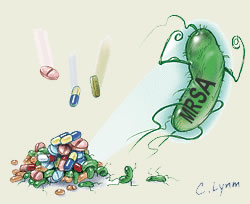 Without new antibiotics, we’re at the mercy of antibiotic resistant bacteria – MRSA, Clostridium difficile, Acinetobacter baumannii, etc. Unfortunately, pharmaceutical companies lack a financial incentive to develop new antibiotics.
Without new antibiotics, we’re at the mercy of antibiotic resistant bacteria – MRSA, Clostridium difficile, Acinetobacter baumannii, etc. Unfortunately, pharmaceutical companies lack a financial incentive to develop new antibiotics.
One reason is that most patients get better when they use antibiotics. Many are prescribed for only a few weeks. It’s much more profitable for drug companies to develop medications that will be used by large numbers of people to suppress the symptoms of lifelong conditions: acid reflux, erectile dysfunction, arthritis, high blood pressure, diabetes, heart conditions.
Another reason is that it only takes a few years for microbes to become resistant to a new antibiotic, even if it’s used sparingly. This obviously shortens the lifespan for revenue from a new drug, which means pharmaceutical development costs can’t be recovered.
As awareness of antibiotic resistant bacteria increases, both the medical profession and the public are encouraged to cut back on antibiotic use. Why would a drug company undertake the enormous expense of developing a drug that doctors will prescribe with increasing caution? Better to convince the public that healthy, asymptomatic adults should be taking statins.
Politicians and policy makers are not convinced there’s a crisis
The pharmaceutical industry has a terrible reputation, much of it richly deserved. Egregious incidents continually come to light, providing an endless stream of fodder for outraged critics. That criticism is absolutely necessary to keep the industry honest (think Vioxx, Zyprexa, Avandia), but it’s doubly tragic.
It’s tragic because, as the evidence indicates, pharmaceutical companies intentionally conceal deadly side-effects of medications, and people die.
But it’s also tragic because we cannot develop new antibiotics without the pharmaceutical industry. Can politicians gain public support to give tax-payer financed incentives to a scandal-ridden industry? It won’t be easy. Without new antibiotics, however, we risk the emergence of a post-antibiotic era.
There has been a 75% decline in the development of new antibiotics since 1983. And the development process is lengthy. If a pharmaceutical company decided today to develop a new antibiotic, it would be ten years before that drug would be available to patients.
According to one expert,
The real issue is that politicians and policymakers have not yet been convinced that the crisis posed by drug-resistant bacteria and the lack of antibiotic development are of sufficient importance, or have reached a significant enough level of public alarm, to act in a meaningful way. In the meantime, more and more patients are dying of increasingly resistant infections that are being treated with fewer and fewer new drugs.
Whose responsibility is it?
Pharmaceutical companies are in the business of making money. As corporations, they would be legally at fault if they decided to be altruistic at the expense of their shareholders. It’s not their responsibility to prevent devastating outbreaks of infectious diseases or to prepare for an attack by bioterrorists.
If it’s not the responsibility of Big Pharma to develop new antibiotics, whose responsibility is it? Try asking that question the next time right wing Republicans rave about government intervention in the health of the nation.
The solution is complex. More on this subject in future posts.
Related posts:
Links of interest: Can honey combat MRSA?
Links of interest: Antibiotic resistance
Overuse of antibiotics: Follow the money (part 1)
Overuse of antibiotics: A remote study (part 2)
Antibiotic resistance genes in soil microbes
Do houseflies spread antibiotic resistance?
Global challenge: 10 new antibiotics by 2010
Gender and racial discrimination at a Pharma giant
Gonorrhea bacteria: The next superbug?
A brief history of antibiotics
Sources:
(Hover over book titles for more info. Links will open in a separate window or tab.)
Brad Spellberg, Rising Plague: The Global Threat from Deadly Bacteria and Our Dwindling Arsenal to Fight Them
Duff Wilson, Risks Seen in Cholesterol Drug Use in Healthy People, The New York Times, March 30, 2010
Jeanne Lenzer, Scandals have eroded US public’s confidence in drug industry, British Medical Journal, July 31, 2004 (free access with registration)
Bob Ehrlich, Industry Reputation Declines Again, DRC Perspectives, June 27, 2008


Sorry, comments are closed for this post.